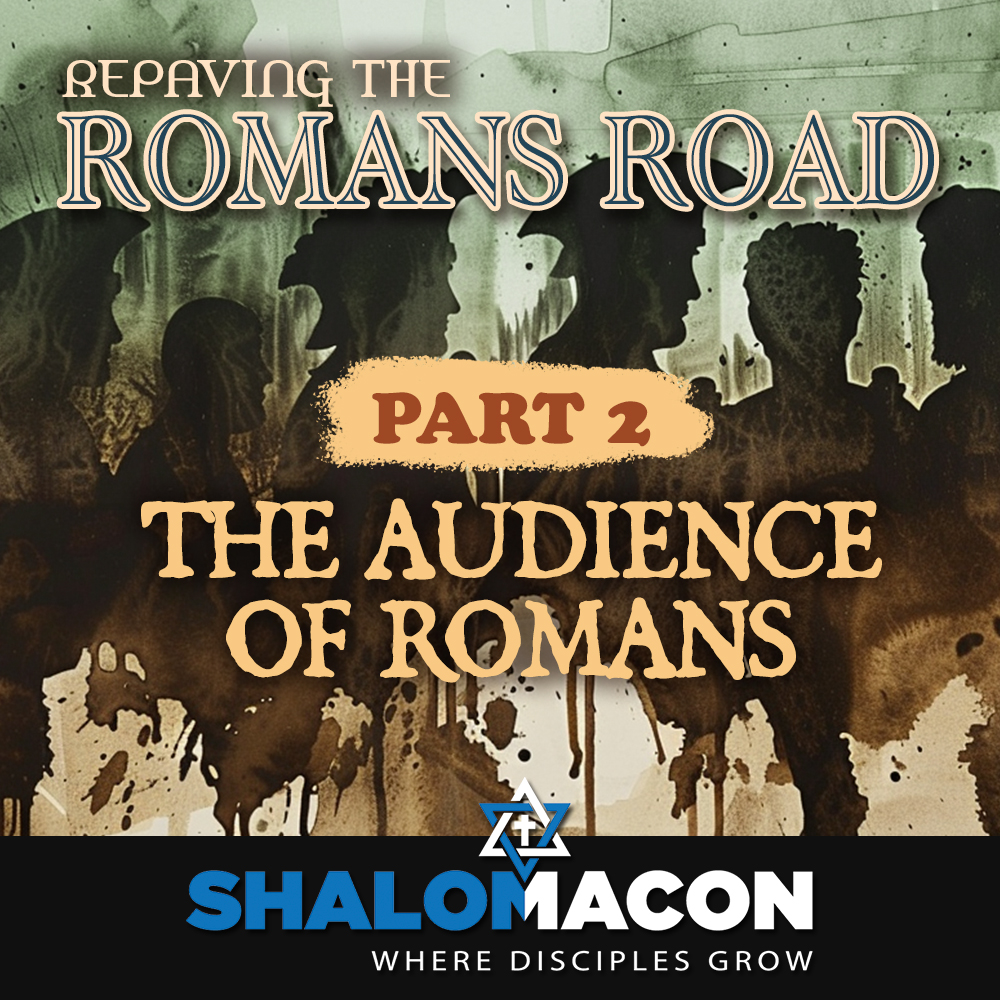Episode Transcript
[00:00:16] Well, it is indeed, in case you didn't know yet, it's Sukote.
[00:00:23] Have we have we did we make that announcement that Sukkot was coming, that it's arrived? And so here's my question. What is the number one thing we will do for the next seven days associated with Sukkot? Stop hint it's in the name. It's a place you go, you dwell there, you eat there, you sleep there. What's the thing we will do as a mitzvah of Sukot for the next seven days?
[00:00:53] Correct.
[00:00:54] We will according to Leviticus 23, for a seven day period, you shall live in booths. Every resident among the Israelites shall live in booths, build a Sukha, dwell in a Suka, take your meals in Asuka. And here's the interesting thing, though.
[00:01:12] Even though that's the holiday's name, Sukkot, plural for Sukha, it's not actually the first thing we find as related to the mitzvah for the holiday. There are many, many beautiful teachings, many about the Sukkot, about the Sukkah. That it's God's embrace that you walk in, and after the holidays, you've got this three sided embrace that the Sukkah represents the clouds of glory that went with Israel through the wilderness. That one of my favorites. If you have never heard or read Rabbi Sack's Nail of Faith Sukkot teaching, look it up, read it. It's wonderful. But like I said, the Sukkah is not the first observance that we find listed in the Torah related to this holiday. I'm talking about in the Party chapter of the Torah, Leviticus 23. Do you know what is the first thing related to the holiday and the Lulav. Okay?
[00:02:27] This is my prop for Shabbat. Thank you, Hosanna.
[00:02:32] In verse 23 before and by the way, this is not the real thing, but it is also the weirdest part of the holiday for people, okay? It is. It's a weird thing for people who don't know what is going on. But in Leviticus 23 40, before the dwelling in booth part, it says, you shall take for yourselves on the first day the fruit of the hadar tree, the date, palm, fronds. You shall take both the willow and the myrtle.
[00:03:08] These are the species, the branch of a braided tree. What is that? That is the arba minim, the four kinds. The four species, etrog, date, palm, myrtle, willow, arba minim, the four kinds, okay? It's this crazy thing that we wave around and rejoice before the Lord with on Sukkot.
[00:03:39] And I'm always so amused when we have visitors who come to the synagogue for a traditional Shakrit sukkot service here, when at some point in the service, all the people take out their the lulav is obviously much bigger. Than that. And some are like this tall and you take and you're sitting there. And a lot of the service has been in Hebrew. You're a guest, you arrive. All of a sudden, people reach and they take this big bush with things attached to it and a lemon, and they start shaking it and waving it. And I am imagining half the time I'm looking this way, but I've turned at some point just to catch a glimpse of people going, oh, God, help me. What kind of cult have I stumbled into here? What is this?
[00:04:38] They're shaking plants, they're singing songs in another language, and they're holding up a lemon. What is this?
[00:04:48] But, you know, honestly, in 2023, it is kind of a funny thing to be doing, but in the Torah, it says this, too. This shall be an eternal statute for you. This thing, that thing that's outside an eternal statute through your generation. God likes it.
[00:05:07] He likes it. It's part of the commanded part. It's the first commanded part.
[00:05:13] It's part of the rejoicing part, which actually is a commandment. You are commanded to rejoice during this season. Okay?
[00:05:27] Now, we know that sukkot is clearly tied to the harvest. It's also called the Festival of in gathering. And in ancient Israel, second Temple Judaism, that period, the harvest is obviously very, very important.
[00:05:42] And this was a harvest festival in some aspects, by the way. The harvest is still very important. It's just that we're so disconnected from the fact that the earth brings us our food, we don't really pay attention to it. That's someone else's problem. But let me tell you, during this season, do pray that the harvest, literal harvest, would be bountiful for the world. This is a time to do that.
[00:06:07] But that's the thing. But these things really are not harvestable.
[00:06:15] I mean, who eats the date from frond? Date? Palm frond.
[00:06:23] Well, you can eat that lemon. It's not a lemon.
[00:06:28] It's called an etrog. That is a citron. Okay?
[00:06:32] It's not really very good, actually. There are a lot of pulp and dry and seeds, and it's not the best to eat.
[00:06:42] So unlike Shavuoto, where we take these fresh loaves of bread and they're waved, and then we have even the omer. We go before God with the sheaf of barley and we wave. We can make good edible things out of those.
[00:06:57] What is this?
[00:07:00] This is not really tied to the harvest or edible fruits, but friends, I'll tell you this, this is as much a part of the holiday as the sukha.
[00:07:10] As much a part? Maybe more.
[00:07:14] It's mentioned first. But what's the deal? Do we really need to be doing this? What is the lesson? It just honestly seems weird, right? It seems weird.
[00:07:26] Side note, side note, and this just popped into my head, it's actually not the only weird thing that people do with trees religiously, though, is it?
[00:07:40] In a few months, people will be going to various shopping center parking lots to purchase an evergreen tree, which they will bring into their home, decorate and make it real pretty, and then just have it sit there and look at it and smell good. Now, listen. Not a slam. Just saying this is actually in the Bible. That's not so. Before you go judging my shaking, waving, Lulov, check yourself in December, though, okay? Make sure now.
[00:08:20] And also, let's be very clear.
[00:08:23] This was happening when Yeshua was walking in the temple. This is happening.
[00:08:31] This is not something that Jesus would have thought was weird. You know what Jesus would have been doing during sukkot?
[00:08:38] Rejoicing? Hanging out in the sukkah and waving his four kinds.
[00:08:46] But anyway, llama. Llama.
[00:08:50] Why in Hebrew? Why? Llama?
[00:08:56] What is the deal with this? Mitzvah? You shall take for yourselves on the first day the fruit of the Hadar tree, date, palm fronds, a branch of a braided tree and willows of the brook, and you shall rejoice before the Lord your God for a seven day period. Well, leave it to us.
[00:09:10] Leave it to us, the Jews, to make something so weird into something so beautiful.
[00:09:18] Leave it to us to read beyond just the letter of the law and uncover for you the spirit of the Law, if I might say, the heart of the matter.
[00:09:33] But let's talk about that. Speaking of the heart, one of the more common teachings related to the Arba Minim, these four species, is that each one represents a certain kind of Jewish person, a human being. The Etrog is one who represents a person who's full of both Torah study and good deeds.
[00:09:54] It's beautiful and it smells good and it's edible. And so this is like the ultimate you want to be an Etrog, and then there's these other people. But the point of that story is that when you put all four of the different types together, you need each other. To be a cohesive society, you need each other. That's one of the teachings. My favorite teaching, though, is the one, one of many, where each of these things represents a part of your body, the lulav, your spine, your backbone, the thing that causes you to walk upright.
[00:10:33] The myrtle.
[00:10:36] Not really quite shaped like that here, but they're shaped like little eyes.
[00:10:41] And those are the eyes, the window to your soul. And the Aravot, the willow. The mouth. It's shaped like a mouth. Why? Because the mouth is such an important part of what you do every day. You can curse and bless with the same mouth, James says. And this what do you think this is?
[00:11:02] In this anatomical comparison? This is your boom boom, boom, boom, boom boom. Your heart.
[00:11:12] The Etrog, represents your heart, the beautiful fruit. Right?
[00:11:21] But let me focus on that for just 1 second.
[00:11:24] The citron.
[00:11:27] The Etrog, by the way, the citron is, if you're ever on Jeopardy, it is the Rutace family citron medica. Okay, you got it.
[00:11:44] This I'll have you know, not this one in particular.
[00:11:48] Well, I'll show you. Let me show you.
[00:11:53] Here's my hadar. Here's my beautiful fruit. It's not quite ripe. It just arrived. But this is my heart.
[00:12:02] And this citron scientifically is one of the parent species of the citrus family. In other words, it is not fantastic to eat on its own. This thing is very pulpy inside and it is dry and has a lot of seeds. But as the parent of citrus fruits, this, when combined with something else, makes every well, a lot of the citrus fruits you love the orange, the lemon, the grapefruit. This thing is at the heart of the matter of citrus fruits, the citron, okay?
[00:12:44] It has a definite prominent position.
[00:12:50] But when looking at the two teachings that I just shared, the Etrog takes a premier place. It's the person with good deeds and Torah study, and it represents the heart inside of you. And that's real nice. That's real nice. But there's a problem with that, isn't there?
[00:13:07] I mean, it represents the heart.
[00:13:12] But isn't the heart desperately wicked, incurably, sick, deceitful? That's what King James says. Many translations just say it's desperately weak. King James goes on to say, your heart inside of you desperately, wicked, incurably, disgustingly, gross?
[00:13:37] He doesn't say that. I added the last bit.
[00:13:42] What is good about the human heart? I mean, who's heard a teaching or this used as a basis for something when somebody makes a bad decision, son, haven't you read Jeremiah 17 nine?
[00:13:58] The heart is despicably, wicked. There's never a chance you're going to do anything good.
[00:14:06] You have a gross heart.
[00:14:10] So we have a difficulty, right?
[00:14:15] What is possibly good?
[00:14:18] What would God want with our heart like this? And why would we consider this beautiful, aromatic, fruit, unique, beautiful thing to represent something like that?
[00:14:30] Despicable and gross and wicked?
[00:14:34] Well, first we need some context, and then we can have some correction and then we can have some joy. How about that for a deal?
[00:14:43] Who's heard that verse? Jeremiah 17 nine. Right?
[00:14:47] Supported, by the way, verses like Romans in this way of thinking which says, for all have sinned and fall short of the glory of God, right? They argue that human hearts are universally sinful. Now, keep in mind, though, that some of this derives from a very unJewish idea that's called original sin.
[00:15:19] Original sin. That all humans inherit a sinful nature. As a result of Adam and Eve's disobedience, the human heart is inherently tainted by sin, making it from birth, desperately wicked and deceitful.
[00:15:36] That's original sin, right?
[00:15:39] I like to clear that up every single time I say those two words. Let me tell you what you inherited from Adam and Eve. You ready? Your heart that you got, it's going to stop beating and you're going to die. You got death. Because with Adam's sin, death entered the world and the whole plan took a shift. You're going to die.
[00:16:01] That's what you got.
[00:16:05] But you can come back.
[00:16:08] That's also what you got. That's part of the plan of salvation and redemption that's available to all of us through the work of Messiah.
[00:16:16] That takes divine intervention. That takes a new heart. But it's not because yours is despicably beyond hope. Wicked.
[00:16:27] But that's what the verse says.
[00:16:30] But I want to ask you who in here?
[00:16:33] Be honest. I don't care if you do. It's fine. We can talk afterwards.
[00:16:38] But I want to know who in here, wakes up in the morning, brushes your teeth, looks at yourself, gets ready, fix your hair, put deodorant on and says, oh, my gosh, you are disgusting.
[00:16:52] You are despicably, wicked.
[00:16:56] You are terrible, deceitful beyond all measure. Who thinks of yourself that way?
[00:17:05] Are you prone to bad choices? Have you made bad choices? Have you been deceitful? Have you been wicked? Yes. Is it your 100% nature at all times?
[00:17:19] Do you think of your heart as one that is constantly plotting evil and wickedness? Is that your every thought that emerges from your heart?
[00:17:29] No. So maybe we have misinterpreted or misapplied or overapplied a verse of scripture and read something out of context. Is it possible? Has that ever happened before?
[00:17:44] I have seen it happen. I have done it.
[00:17:47] But listen. The sin of Judah is written with a pin of iron, with a point of diamond. It is engraved on the tablet of the heart. What is engraved? The sin of Judah. There's a contextual thing occurring in Jeremiah 17. He's talking to Judah about their turning away from God. Not Judah, the individual. Judah Israel, the tribe turning away from God and teaching their kids wrong and asherapoles and false gods. And he's saying, the sin is written on your heart, the point of a diamond engraved it on the tablet. Cursed is the man who trusts in man and makes flesh his strength. Listen to this. Whose heart turns away from God.
[00:18:37] Who is cursed? The man whose heart turns away from God.
[00:18:44] So there's this particular situation. It goes on to say, blessed is the man who trusts in the Lord. Whose trust is the Lord. He's like a tree planted by water, that sends out its roots by the stream and does not fear when heat comes, for its leaves remain green and is not anxious in the year of drought, for it does not cease to bear fruit. Then it says, the heart is deceitful above all things. Desperately sick. Who can understand it? I, the Lord, search the heart and test the mind to give every man according to his ways, according to the fruit of his deeds. We should probably understand this in context.
[00:19:21] Blessed is the man who trusts in God, produces good fruit beauty. Out of where come the things that you do. Out of your heart are spoken both good things and bad things. Blessed is them are cursed.
[00:19:38] It emphasizes that the human heart can be deceitful and wicked.
[00:19:47] And cursed is the man who trusts in himself and other men and other earthly things.
[00:20:00] The heart can be deceitful. So let me ask you this question. There is this conditional meaning that the heart becomes deceitful when it turns away from God?
[00:20:16] Where were you five days ago?
[00:20:22] I'll remind you, you were in the days of Teshuva, in the days of Yom Kippur, the high holidays. You had been there for some time. We had spent five weeks through these days coming up to and five days ago, roughly, you were in this journey of Yom Kippur. The restoration of something was taking place there. Do you know what it was?
[00:20:46] Your heart.
[00:20:48] Because you had turned away in some ways, because you had made bad choices. You had missed the mark. And what were you doing there?
[00:20:59] You were repairing your heart.
[00:21:04] You were not permanently, desperately wicked or weaker. You never would have even shown up.
[00:21:12] But you showed up for some repair. Let me tell you about your heart, that it is not desperately wicked or weak, beyond all repair.
[00:21:23] The Hebrew heart is considered the center of human decision making, the seat of your thoughts and emotions. It's way beyond the physical organ, the seat of where you think and feel your moral and ethical decision making. Repentance and teshuva are birthed in the heart. And the heart played a central role in that.
[00:21:48] To repent meant not only to change your actions, but also to undergo a sincere change of heart, your relationship with God. That's where that place is nurtured between you and God. Love and devotion and faith. Teachings of wisdom reside in your heart.
[00:22:12] The heart of the wise. We read Kohelet, we read one of Solomon's writings. His in Proverbs says, the heart of the wise makes his speech judicious and adds persuasiveness to his lips. The heart in Judaism is a powerful, powerful symbol in literature and liturgy.
[00:22:34] It's human consciousness, but also spiritual death depth. I'm sorry. So what does this lemon looking thing and Jeremiah and Sukkot, what is all of this? Why is this a sukkot teaching?
[00:22:54] Well, sukkot is the time of rejoicing for many reasons. Many reasons.
[00:23:00] It's the harvest. It's God's provision and protection symbolized in the sukkah. But these four species, these four kinds, there is a picture of you and your heart here that you need to see yourself emerging from that heart procedure and set it right positioned properly. This is called a beautiful fruit.
[00:23:29] A beautiful fruit.
[00:23:33] Is that beautiful?
[00:23:35] It's sort of strange looking, very bumpy. And beautiful is not exactly the word that comes to my mind when I look at an Etrog. I think a pineapple is prettier than that.
[00:23:55] It's sort of a weird looking thing, kind of like the whole deal. So it's a little bit weird, just like the shaking and waving thing. But what this is, is actually a beautiful picture of your heart, which is also equally unique and bumpy, not literally, but your heart, through the journeys of life, acquires a little bit of character, doesn't it?
[00:24:32] And the human heart is indeed beautiful. It's not symmetrical, but the heart you brought out of Yom Kippur was the best it can be and still bumpy and unique and oblong and asymmetrical because that's the heart you got.
[00:24:58] But it's represented here.
[00:25:03] And so when we take these things and we hold them before God and we waive them, it is indeed everything I told you in the first part of the teaching. Can you survive with a broken spine or an eye out or with your tongue cut out? I have a guy who survived a broken spine right there.
[00:25:32] Could he survive a broken heart? Like, literally, that doesn't work anymore? No.
[00:25:40] The entire species of you depends on this, which is not desperately deceitfully wicked. As a matter of fact, right now it is beautiful with all of its bumps and unique characteristics. And so why are we rejoicing? And what is this thing? This thing is you with a new heart. And when you renew that heart and you make the choice to be one who is blessed in God, who does not trust in man or money or the world or those kinds of things, then this heart affects everything else and your spine becomes a little more upright.
[00:26:24] That you might walk with the Lord humbly, but loving others. That the eyes which you are renewed through the Yom Kippur and the holidays begin to see the good in the people around you. Your spouse, your parents, your boss, your kids, everything. A transformative experience with your eyes and your mouth. Your mouth begins to declare the goodness of the world. And you stop gossiping and cursing other people. Why? Because you got a new heart.
[00:27:00] And when you put that together and you come into the sanctuary of God and into the sukkah and you do this, you're saying, God, you got all of me.
[00:27:13] Thank you.
[00:27:15] And I want to spend the next seven days with you. Eight if we count that other funny day called shminyatzerit. I want to spend those days with you being strengthened, being grateful for what you've done. And next week we'll talk about as sukkot ends. Let's not rush that.
[00:27:34] We'll talk about what do we do with our four species body when we walk out of the sukkah and we're coming down the mountain and we're going back out there in the world. We have to talk about that, but not today. Instead, today you take that new heart and that attitude into the year to love God, to love people, to see good, to speak good, to walk good, to do good. And that would be worth rejoicing over, wouldn't it?
[00:28:01] So that makes this a lot less weird when you imagine that you are bringing yourself to God. And I hope that the next time you want to run out the door because you see people shaking a lulav and etrog, you actually know what's going on, I hope you have your own, and I hope you're waving it furiously with gratitude before the Lord.
[00:28:27] Shabbat Shalom and Hag Sukot Samayach to you may your hearts be blessed.



